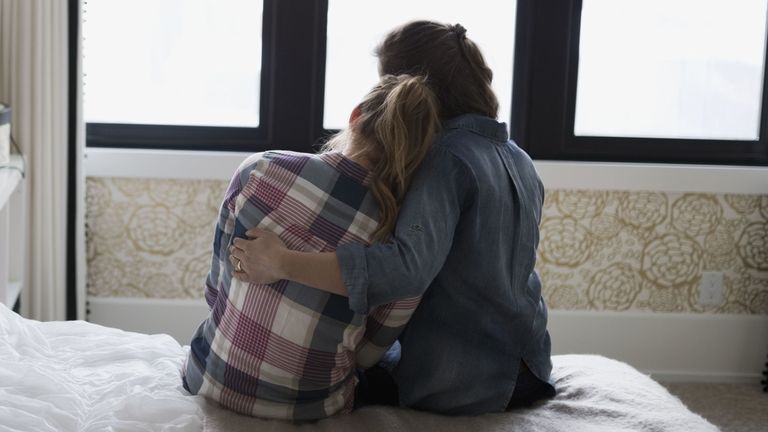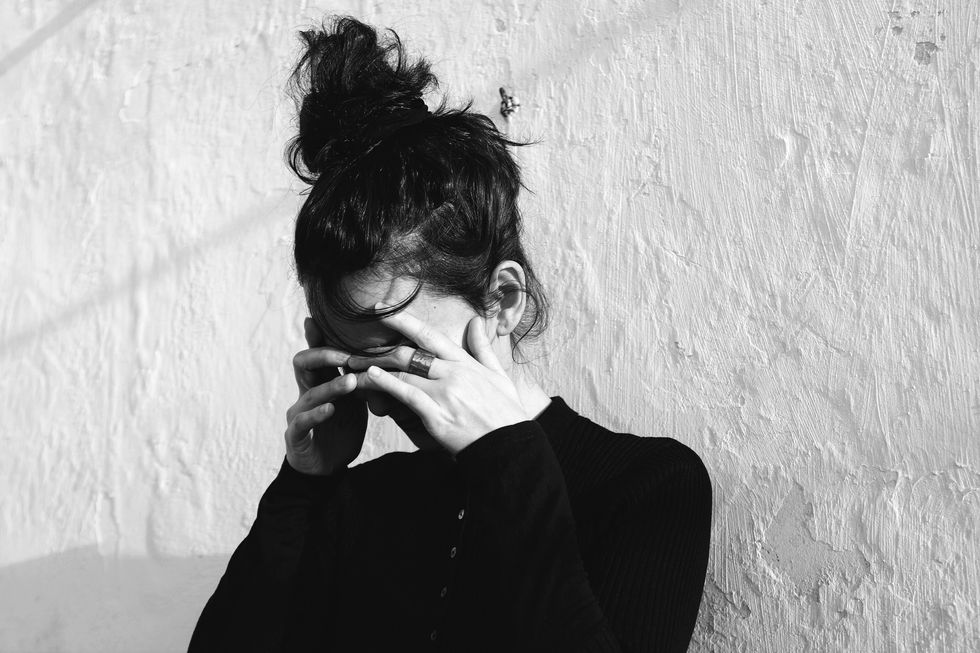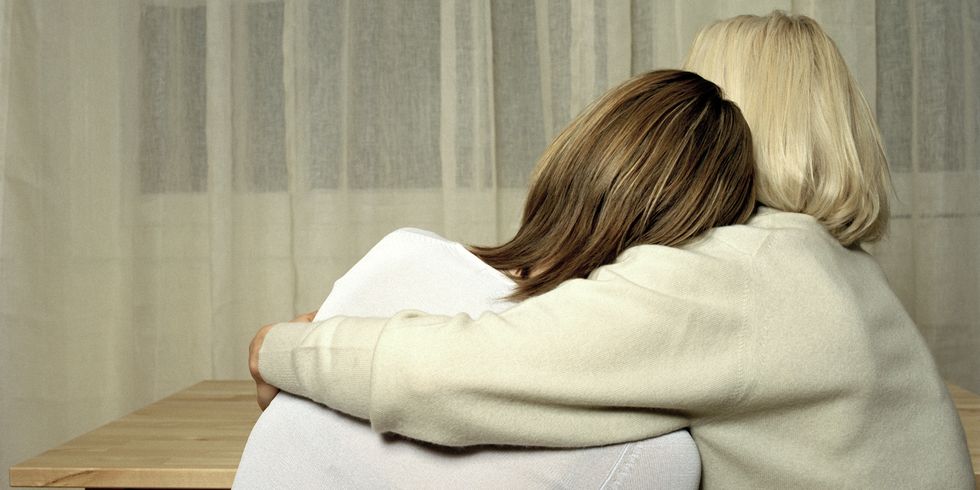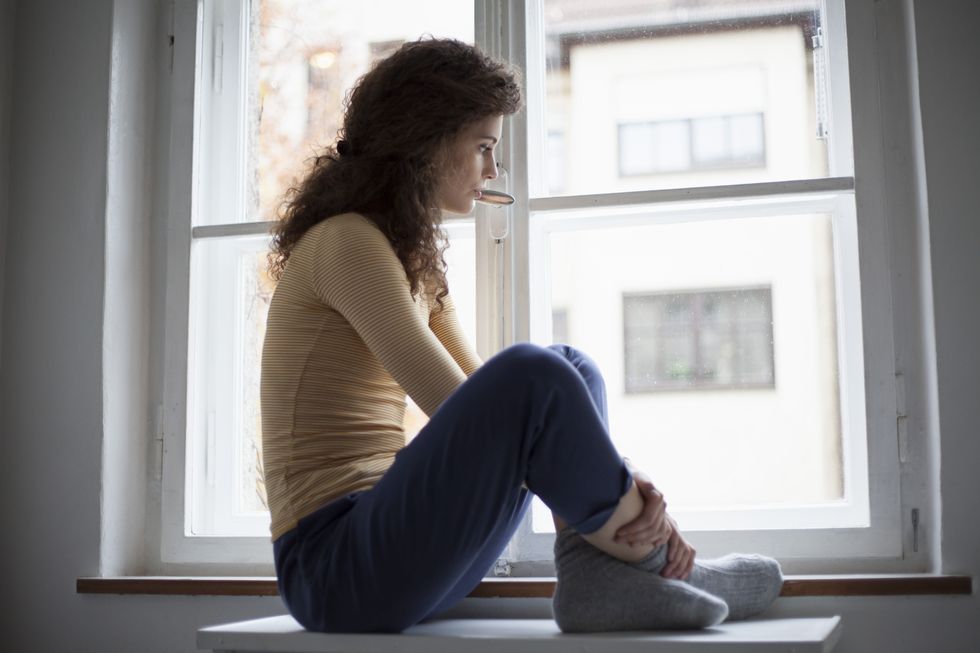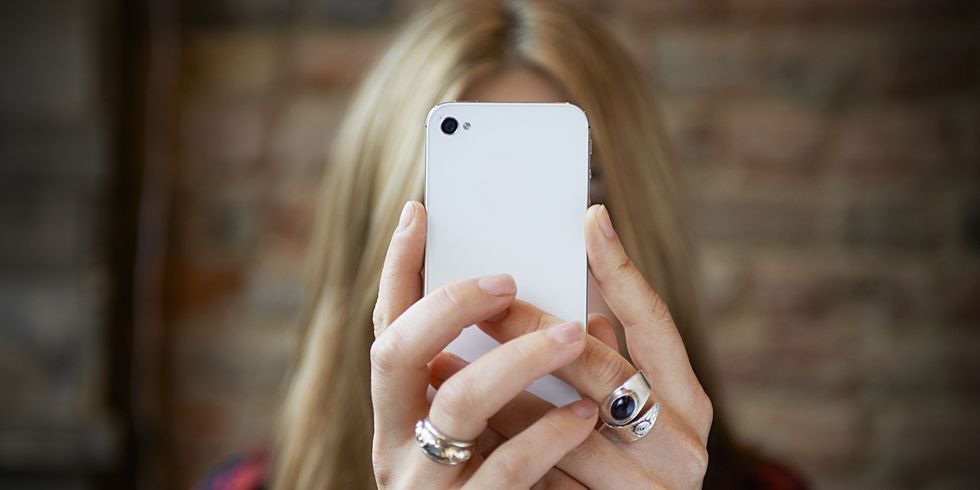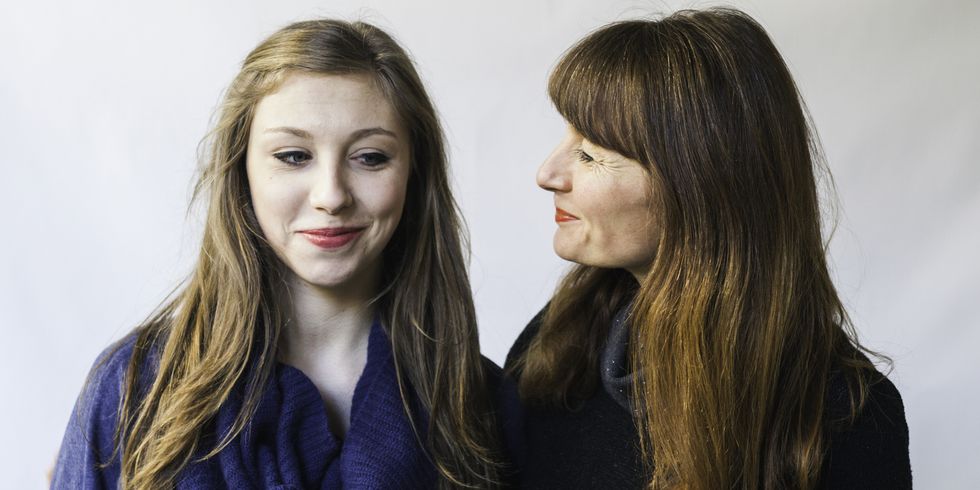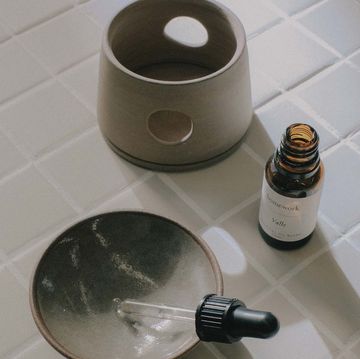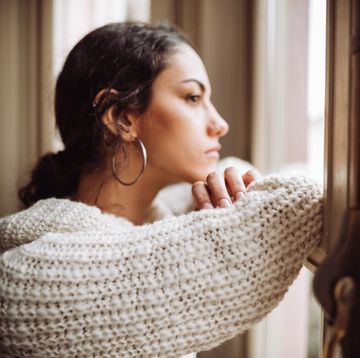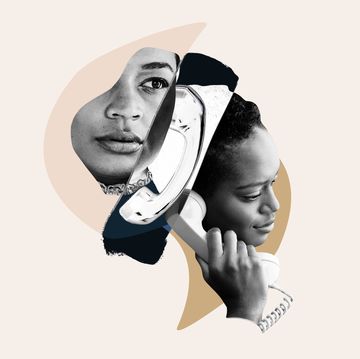Hands up who's ever spoken to their parents about mental health? Ok, hands up who's ever spoken to parents about their mental health, rather than your own? Keep them up if they've ever given an answer that doesn't sound eerily similar to tumbleweed? Yup, we figured it would be a pretty hand free zone.
Why? Because although almost 50 per cent of adults aged 55 and over say they've experienced depression (that's a casual 7.7 million people) and around the same number have experienced anxiety, almost none of them are talking about it. Seriously, 60 per cent of adults suffering from anxiety or depression don't think it's even worth bothering their local GP about, and 70 per cent wouldn't turn to friends or family willingly.
Which means, chances are, at least one, if not both of your parents have suffered from a mental health problem at some point that you probably didn't know about.
So, if you've never asked your parents about their mental health, then now might just be the time to start.
The question is, how can a generation so open about mental health help shatter the often deafening silence for our parents? It's time for that long overdue conversation...
It's A Generation Thing
Although we can probably all agree that delving into your own mental health problems with your parents isn't exactly a laugh a minute, getting them to talk about their experiences can feel almost impossible.
'In recent years there's been nothing short of a cultural revolution in our willingness to be open about mental ill health,' says Age UK Director Caroline Abrahams, 'but it's one that may well have left many older people behind.
'They grew up in an era when there was a real stigma associated with mental illness so for many, these attitudes are deeply engrained and still driving their behaviour today.'
This is something 28-year-old Mia* experienced with her dad. 'Growing up, I always knew my dad was both a successful man but also someone who privately struggled with alcohol addiction,' she says.
'For the most part, he was kind, generous and full of love and on the face of it we had an idyllic life - the big house, parents in good jobs, kids in private school and nice holidays, but behind the façade was total chaos. There was a real sense of shame with what he struggled with, and it was completely hushed up in public - even to close family members. Any relapse was treated like a dirty little secret that we were sworn to protect.'
Mia's dad isn't alone in the perceived stigma attached to mental health by a generation taught to have a 'stiff upper lip', often by their own parents.
'It's this old stigmatised view of mental health as a weakness and not a 'proper' illness that can actually lead people into depression,' says Chartered Counselling Psychologist Louise Watson.
'There is a need to be too strong and too perfect.'
How The Millennials Are Doing Mental Health Differently
Between unhealthy obsessions with Netflix true crime box sets and saying 'YAS' too much, it's easy to be condescending about Gen Y, but one thing we should be proud of is our ability to facilitate open and honest conversations about mental health.
'We're used to sharing with groups of people, whether that's your Facebook list of 800 people, or your Instagram stories,' says Millennial Expert and CEO of FindSpark.com Emily Miethner. 'It can be something random like your breakfast or posting to say you couldn't get out of bed today, either way just sharing and talking about things is something that our generation is more used to in a much more public way.'
Not only are we sharing, but we're also seeking out help, advice and information more than any generation before us. 'We get a lot of website traffic when we do things about millennial anxiety or depression, things to do with social media, social anxiety, panic attacks… Things that are certainly more talked about by younger people,' founder of the website Well Doing Louise Chunn told The Debrief. 'In fact, I estimate that millennials make up two thirds of our users.'
With everyone from Cara Delevingne tweeting about her battle with depression, to Selena Gomez getting inked with a semi-colon to mark her solidarity with mental health sufferers, there's a very public conversation endorsing good mental health, even from the A-list.
Finding The Right Language
As a generation whose second language is more likely to be coding than Cantonese, our fluency in all things internet means the information about mental health, and in turn the vocabulary we have at our disposal to talk about it, is often much more expansive (and accurate) than our parents'. Add to that the fact that 35 per cent of over 55-year-olds experiencing anxiety and depression said they didn't know where to go for help and support, and you've got a generation floundering in silence.
'There's a lot of terms banded around by older generations that are inaccurate and display an ignorance about mental health', says Louise Watson. 'They often have a dismissive quality as well, for example, they might say "She's having trouble with her nerves", rather than talking about anxiety.'
So how do you talk to someone about their mental health when even they don't know how to describe what they're feeling? Oh, and that person happens to be your mum.
Bea*, 29, drew on her own mental health diagnosis to help her mum access the language to describe what she was experiencing. 'Everything is in the vocabulary – because you can't understand it if you don't have the language or the knowledge,' she says.
'When I was first diagnosed with general anxiety disorder at the age of 20, the world opened up in a way that I hadn't seen it before. Once I became ill I suddenly saw patterns of my own mental health in my mum. This year I was also diagnosed with Cyclothemia (a form of bipolar) and also PTSD. It was actually a really lovely moment because my mum felt that suddenly everything made a lot more sense.'
'Although, after that I had a tendency to try and diagnose absolutely everyone, including my mum, which she didn't appreciate. We generally avoid labels or bold statements like, "You know you've got social anxiety, right?" or "Actually what we've discussed is you coming out of a period of depression".
'Instead, we approach it in a more compassionate way and both share how we're feeling - sometimes we talk about how she can help alleviate her social anxiety by calling friends and making plans, and sometimes it's me saying, "I'm feeling really low today" and she knows I just need love and to know I'm safe. We make sure we're both checking in with each other.'
It's fair enough, labels are scary. They're confirmations of something previously intangible and for a lot of adults, official diagnoses can feel daunting. Especially coming from a child.
'If you want to talk to a parent, but you think it could be a sensitive situation, try introducing a third party, for example a check list,' says Louise Watson. 'You could say you've been noticing that they've been doing some of these things and ask what they think. Alternatively, speaking from your own experience can help.'
Understanding that the stigma attached to mental health could make them reluctant to communicate is key, explains Watson, 'I think physical analogies always help. Think about it like healing a broken leg. You'd take the weight off it, take the pressure off and give it time to heal - you wouldn't tell people you have weak bones. It's about changing that attitude.'
Sharing Is Caring
Admittedly, the thought of having a sit down chat with your parents about their mental health isn't always an appealing one. Because as much as we love having a glass of wine and discussing Brexit with them, talking about their vulnerabilities can often be a step too far for our burgeoning attempts at adulting.
'I think it's a pretty jarring experience to cross that line with a parent and understanding that they're just a human and they have as many issues as you,' says Miethner. 'But it's definitely a collection of those moments that change your relationship so you're connecting as fellow adults, rather than parent and child.'
As uncomfortable as bursting that bubble may be, it's kind of essential to getting everyone on the same page. London-based Mia* agrees, 'As I've got older I've tried to break down that parent/child barrier and just talk really openly about things we're struggling with,' she says. 'My mum is very judgemental but my dad isn't and being able to be open and tell him all the issues I've had and where I'm finding that help has really helped him to go and seek out the same thing.
'I've also learnt to understand him a lot more. It became clear he suffered with depression (which he was later diagnosed with) and used alcohol as a crutch to support him when things were hard. His addiction was a response to an accumulation of causes that I wasn't equipped to understand at such a young age, but am now. Understanding and accepting this has allowed me to support him better as an adult and love him more easily.'
It's all about sucking it up, and finding your common humanity. But is there a point where our 'helpfulness' can become detrimental? After all, how many parents do you know that like being told what to do?
'The danger of having a parent with a mental health issue could be that the child can then feel that they have to cling to the parent role at the expense of developing their own life,' says Watson. 'It's important to ensure the child doesn't take so much responsibility that they're parenting the parent. It needs to be an adult to adult supportive relationship.'
Or as Bea* experienced, 'After I experienced sexual trauma, it became very difficult for my mum and I to manage our communication, because I think that kind of thing is too much for any parent,' she says.
'It made us both very vulnerable, but because we both value our relationship as mum and daughter so much we've worked through it. I definitely had to take a gentle step back and let her be a mum to me. I kept playing therapist and acting like I knew what was best which was incredibly unhelpful for her. Backing off let her come back into her role as mum and it feels like we're balanced again.'
Finding Their People
Although our generation are constantly communicating, it's fair to say we're kind of allergic to talking on the phone. Which means we've sought other ways to find a supportive network. Be it talking in forums, taking part in hashtag movements on Instagram or simply WhatsApping the right friend, we're pros at seeking out our 'tribe'.
And when 72 per cent of older people agree that feelings of loneliness and isolation could make mental health conditions worse, being part of a community that can relate is more important than ever, especially for your parents.
But, if your mum and dad are anything like ours, they're not exactly social media pros. Which means finding other options. 'Mental health groups are a great place to start for face to face support,' says Watson.'However, if anonymity is important, then the internet is a great way to feel less alone and remain faceless.'
The irony? Our desire to share on social media often results in a cathartic exposure of our mental health problems to a massive audience. On the flip side, an older generation that would prefer to be more discreet can use the daunting expanse of social media to remain anonymous, whilst still engaging with a supportive network of strangers.
'Part of the shame of everything my dad went through when he was younger meant that my parents lost their friends, so we became this horribly closed family that never spoke to anyone,' says Mia*. '
Now my dad follows an old school friend of mine who is very active on social media about her own mental health. It means he can look her up and see other people online being open and honest without being judged which has encouraged him to find other outlets and forums where he can talk about himself.'
For Bea* it's simply a matter of more casual, constant communication via WhatsApp. 'My mum is particularly affected in winter and being on her own makes things worse,' she says. 'I'm really excited to get her a smart phone for Christmas because I think it'll make her feel more connected. By sharing our experiences in a more casual way, we're helping to give everything less power.'
And when it comes to biting the bullet and getting treatment? It doesn't have to be a trip to the local GP they've known for 20 years where they're forced to say something out loud that they're not ready to give power to.
'Mental health services are so much more accessible than they used to be,' says Miethner. 'I use an app called Talk Space where you get assigned a therapist who you can text, video chat or send voice messages to at any time of the day. It's no longer the case that you have to go to somebody's office and sit with them for an hour, you can do it very discreetly and very conveniently.'
Could technology be the solution to breaching the generation gap of good mental health? Maybe, maybe not. What we do know is that it's never too late to talk.
Calling all you millennials! It's time to get your parent/child communication on, for the good of everyone's mental health.
Where To Get Help
Age UK runs a range of services to help support older people with mental health problems from Men in Sheds clubs to dedicated counselling services. There is also a free guide called Your Mind Matters focusing on improving mental wellbeing which is available on the Age UK website and via the Advice Line on 0800 169 6565.
Alternatively there's a whole range of charities and organisations waiting to help support you. We spoke to the Mental Health Foundation for this piece (and rather liked them).
*Names have been changed
George Driver was the former Senior Beauty Editor - Digital at ELLE UK.
